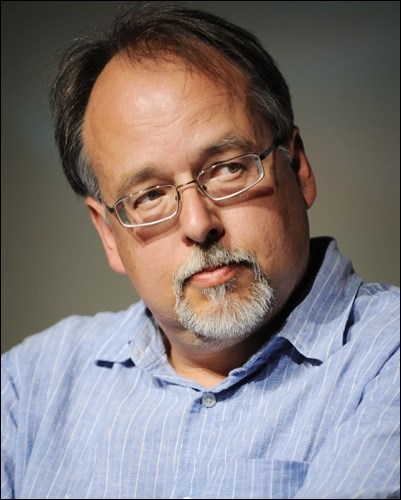It’s time for a wake up call when it comes to examining the extraction and export of shale gas –��also known as fracked gas – from British Columbia, according to award-winning author and journalist Andrew Nikiforuk.
Nikiforuk is speaking next Thursday (Sept. 25) at Quest University at 7 p.m. on the current provincial, national and global state of shale gas development and its impacts on democracy, environmental justice and economic resiliency, as well as the implications of having a liquefied natural gas (LNG) terminal in Squamish.
The event is hosted by My Sea To Sky, a group created “in response to growing concerns about the proposed Woodfibre LNG project,” according to their website.
“There are a slew of issues British Columbians have not paid enough attention to concerning the rapid development of shale gas in their province,” said the investigative reporter from his home in Calgary. “This is a radically important issue for British Columbians –��one they should be very familiar with.”
Nikiforuk says we’ve been down this road before. Both the forestry and mining industries are excellent examples where “nothing was saved and nothing was gained.
“It’s too rapid. There are scientific uncertainties –��climate issues and water issues and other unknowns. It’s high risk and the province of С����Ƶ has no expertise in this,” he said, explaining that more research needs to be done and information shared with residents of the province.
“The government of С����Ƶ should build a small LNG terminal, get experience and then decide how it wants to proceed. They should first be concerned about guaranteeing the best outcomes for С����Ƶ and British Columbians should be asking questions as to how they will do that.”
“The idea they are operating on is that they have to capture high prices in the Asian market,” he said, adding there is no guarantee what the market will offer by the time any of the 13 proposed С����Ƶ LNG terminals are complete.
“This resource belongs to the people of С����Ƶ but the people have not been given enough information. They’ve been given no options – the government says they want to sell to Asia, but maybe that’s not the best way, maybe it’s too fast. There has been an absence of good public discussion, of good public reporting.”
Nikiforuk is also skeptical about what he calls a “Third World extraction program.”
“This program is much like a third world model of development like the kind we are seeing in Papua New Guinea. It’s not what you would expect,” he said, adding that Australia is a leading exporter of LNG with a great deal of infrastructure –��and its own share of contention between government and residents.
Nikiforuk questions the business partnering between the provincial government and Petronas LNG, a state-owned company he says reports solely to the Malaysian prime minister. “They don’t even report to a parliament.”
“Petronas is behind Woodfibre LNG. We need to ask about its transparency and its credibility.”
Nikiforuk also calls into question the ethics and even the prudence surrounding the support С����Ƶ Liberals have given to the industry.
“The С����Ƶ government has an odd approach to shale gas development: incentives, low royalties to companies, free geological information and studies… the state is actively subsidizing the development and the only [fiscal] plan is to tax the gas as it leaves the province – initially at one per cent. Maybe that could go up to seven per cent, but it could also go down.
“Are British Columbians getting their fair share of this? I don’t think so.”
The impact both globally and closer to home concerns Nikiforuk, whose latest book, The Energy of Slaves: Oil and the New Servitude, argues that the energy institution of slavery has shaped our careless use of fossil fuels. The radical treatise calls for a moral revolution in our attitudes towards energy consumption.
“We should act as owners,” he said, giving a nod to an eco-mantra he shares on his website. “Since 2008 I have advocated for a national debate about the pace and scale of tar sands development.
“And since 2010 I have endorsed a conservative and Norwegian-like solution to Alberta’s chaotic bitumen development. It was first articulated by former [Alberta] premier Peter Lougheed and includes the following principles: Slow down, behave like an owner, collect our fair share, save for the rainy day, approve one project at a time, clean up the mess, add value to the resource. To Lougheed’s original list, I would add a national carbon tax.
“Owners control pace and scale of development. Brute force mining extraction technologies are rapidly approaching a time where it will be more difficult to extract hydrocarbons. And all of this leaves a huge carbon footprint and a constellation of issues: It has catastrophic effects on global health including the acidification of our oceans.”
Nikiforuk says a slowdown is in order, that investment in alternative energy resources should be a priority, and as consumers we need to change our energy consumption patterns and habits.
��
“We are too fossil fuel dependent yet we live in a fossil fuel economy. It’s the energy monopoly of the government and we are locked in the moment of a dangerous situation.”
Nikiforuk says we must change how we use fossil fuels top to bottom.
“The depletion rate of conventional fossil fuels is four per cent a year. We should put four per cent into energy programs and incentives. It takes an enormous amount of leadership – which we don’t have – to make a change like this. But in 30 years we could be much less fossil fuel dependent.
“It’s going to take radical changes in consumption.”




